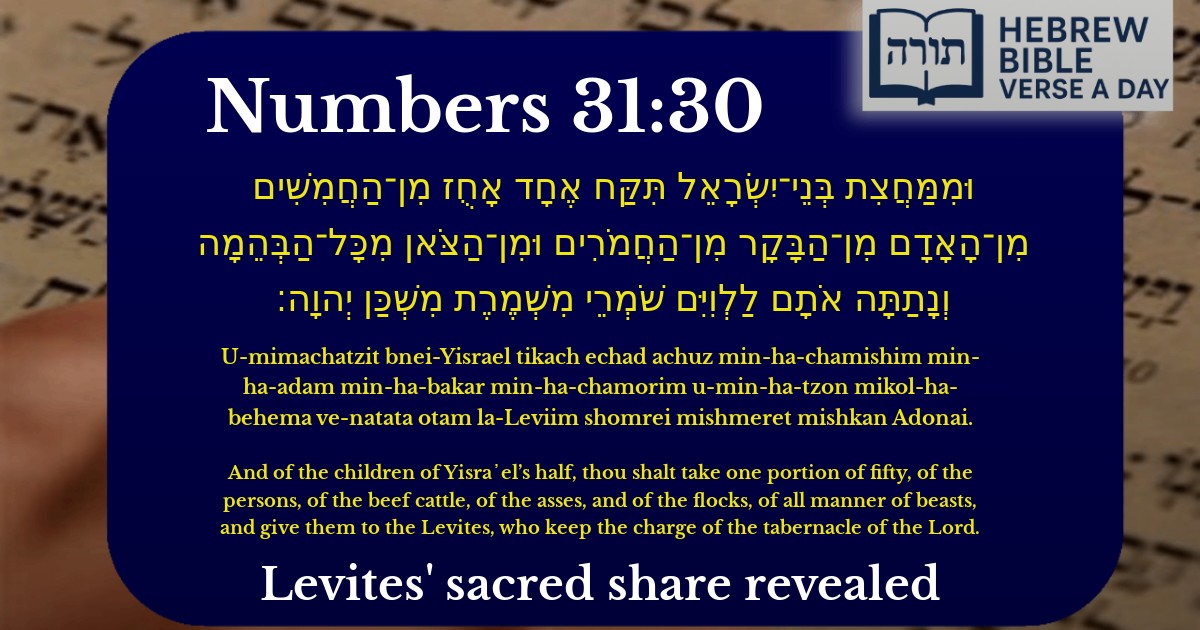Join Our Newsletter To Be Informed When New Videos Are Posted
Join the thousands of fellow Studends who rely on our videos to learn how to read the bible in Hebrew for free!
Hebrew Text
וּמִמַּחֲצִת בְּנֵי־יִשְׂרָאֵל תִּקַּח אֶחָד אָחֻז מִן־הַחֲמִשִּׁים מִן־הָאָדָם מִן־הַבָּקָר מִן־הַחֲמֹרִים וּמִן־הַצֹּאן מִכָּל־הַבְּהֵמָה וְנָתַתָּה אֹתָם לַלְוִיִּם שֹׁמְרֵי מִשְׁמֶרֶת מִשְׁכַּן יְהוָה׃
English Translation
And of the children of Yisra᾽el’s half, thou shalt take one portion of fifty, of the persons, of the beef cattle, of the asses, and of the flocks, of all manner of beasts, and give them to the Levites, who keep the charge of the tabernacle of the Lord.
Transliteration
U-mimachatzit bnei-Yisrael tikach echad achuz min-ha-chamishim min-ha-adam min-ha-bakar min-ha-chamorim u-min-ha-tzon mikol-ha-behema ve-natata otam la-Leviim shomrei mishmeret mishkan Adonai.
Hebrew Leining Text
וּמִמַּחֲצִ֨ת בְּנֵֽי־יִשְׂרָאֵ֜ל תִּקַּ֣ח ׀ אֶחָ֣ד ׀ אָחֻ֣ז מִן־הַחֲמִשִּׁ֗ים מִן־הָאָדָ֧ם מִן־הַבָּקָ֛ר מִן־הַחֲמֹרִ֥ים וּמִן־הַצֹּ֖אן מִכׇּל־הַבְּהֵמָ֑ה וְנָתַתָּ֤ה אֹתָם֙ לַלְוִיִּ֔ם שֹׁמְרֵ֕י מִשְׁמֶ֖רֶת מִשְׁכַּ֥ן יְהֹוָֽה׃
Parasha Commentary
📚 Talmud Citations
This verse is not quoted in the Talmud.


Context of the Verse
This verse (Bamidbar 31:30) appears in the context of the distribution of spoils from the war against Midian. Hashem commanded Moshe to divide the spoils equally between the warriors and the rest of the congregation. From the half given to Bnei Yisrael, a portion (one out of fifty) was to be separated and given to the Levites as a tribute for their service in the Mishkan.
Rashi's Explanation
Rashi (Bamidbar 31:30) explains that this portion was taken from the half belonging to Bnei Yisrael (not the warriors' half) and given to the Levites because they were not involved in the battle. The Levites, who were dedicated to the service of the Mishkan, received this tribute in lieu of a share in the spoils of war. Rashi further notes that the ratio of one out of fifty is less than the usual ma'aser (tithe) given to the Levites (which is one out of ten), indicating a special, reduced rate for this circumstance.
Rambam's Perspective
In Hilchos Terumos (1:6), the Rambam discusses the general laws of terumah and ma'aser, emphasizing that the Levites were entitled to portions of the produce and spoils as their inheritance in place of land. This verse reinforces the principle that the Levites, who devoted themselves to divine service, were sustained by the rest of the nation.
Midrashic Insights
Halachic Implications
The Sefer HaChinuch (Mitzvah 394) derives from this verse the broader obligation to support those who serve in the Beis HaMikdash or teach Torah. Just as the Levites were sustained by the community for their sacred duties, so too must Torah scholars and religious functionaries be supported in later generations.
Symbolic Meaning
The Kli Yakar (Bamidbar 31:30) suggests that the ratio of one out of fifty alludes to the idea that material wealth must be sanctified in small measures to higher purposes. By giving a portion to the Levites, Bnei Yisrael acknowledged that their military success and possessions ultimately came from Hashem and required spiritual stewardship.